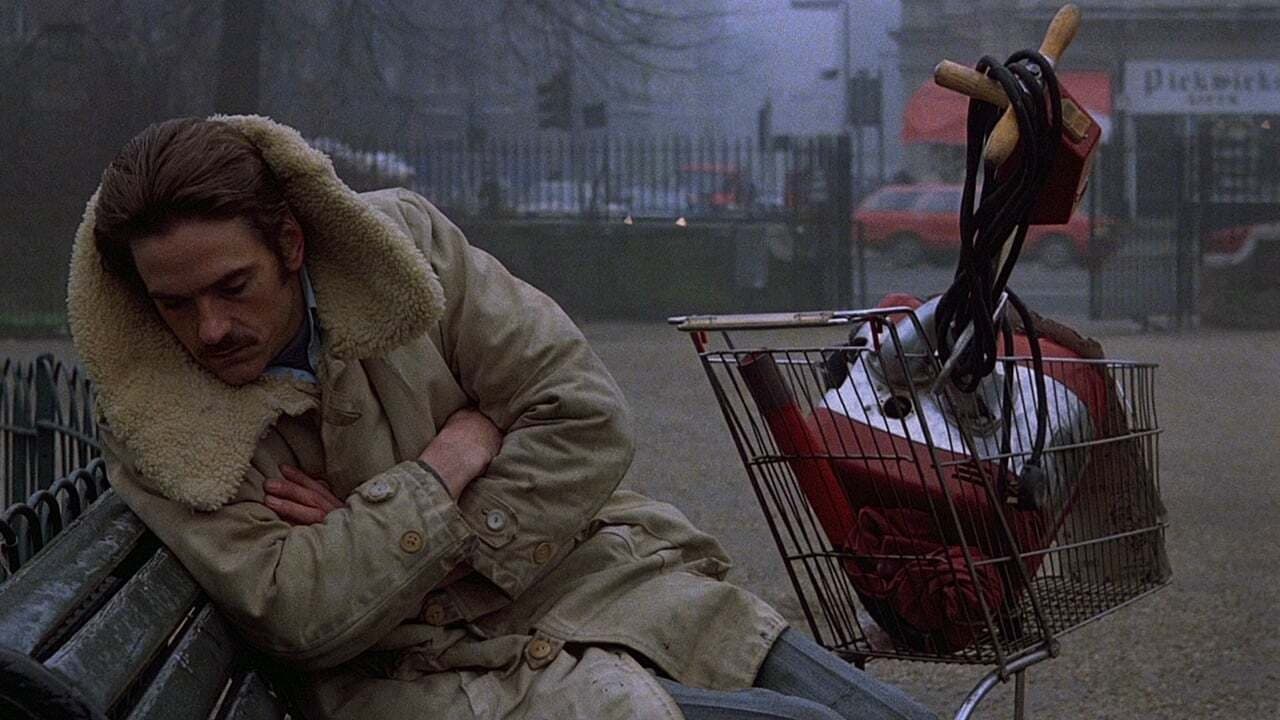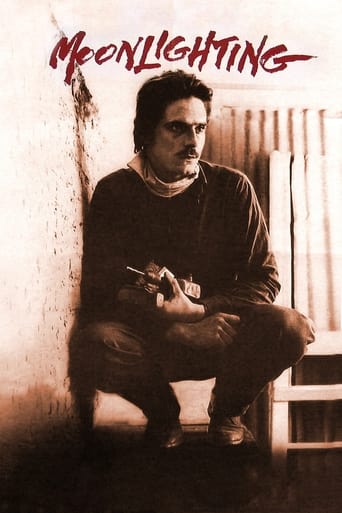

SERIOUSLY. This is what the crap Hollywood still puts out?
... View MoreA Disappointing Continuation
... View MoreInstead, you get a movie that's enjoyable enough, but leaves you feeling like it could have been much, much more.
... View MoreGreat example of an old-fashioned, pure-at-heart escapist event movie that doesn't pretend to be anything that it's not and has boat loads of fun being its own ludicrous self.
... View MoreLed by Nowak, the only member of the group with minimal English skills, four Polish contractors arrive in London to gut and refurbish a row house that belongs to their boss back in Warsaw. Heavily laden with tools and carrying only enough cash for materials, bare living expenses, and little entertainment, the four face separation from family and an often hostile English environment. However, the money earned will go a long way in Poland, and their boss will have a renovated London flat at a quarter the cost of using English labor.Written and directed by Polish playwright Jerzy Skolimowski, "Moonlighting" is a low key film that focuses on the interaction among the four isolated men, who live, work, and sleep in the flat. Nowak, Jeremy Irons in a quiet understated performance, is the only one to regularly venture outside to find food and building materials. Faced with dwindling funds, Nowak devises various methods to shoplift goods or outwit store managers and cleverly double his grocery purchases. While sheer luck often aids Nowak with his dodgy schemes, the English shopkeepers seem remarkably dim, and the immigration officer on arrival at Heathrow was unbelievably gullible.The story takes place in 1981, the year the film was shot, and, while Nowak struggles with finances and an approaching deadline, Poland stumbles into a military coup, and martial law is imposed. With phone lines cut between London and Warsaw and all flights to Poland canceled, Nowak must conceal the events unfolding at home from his compatriots to keep them focused on finishing the flat. Because three of the four principal actors have few lines and those only in Polish, the film concentrates on Irons, who ably carries the film. Although much of the action takes place inside the flat, Skolimowski's direction manages to avoid a claustrophobic feel. However, "Moonlighting's" leisurely pace does require patience. But Nowak's sharp wits and audacity, fueled by his determination to complete the assigned task despite the mounting odds, make for engrossing viewing. Skolimowski's "Moonlighting" is a small, overlooked film with many rewards for discerning viewers to discover.
... View MoreOne of the previous commentators tells us that Skolimowski wrote the script in one day; this shows. We do not hear any conversations between the workers who are heroes of the film ! We hear sometimes thoughts in the head of the main character. The martial law period in Poland was aimed at crushing the Solidarity movement. It succeeded - for some years. Compare this film with wonderful "The man of iron" directed by Andrzej Wajda who shows the birth of Solidarity. So much could have been done showing how Solidarity was crushed - only the director who is also the script writer had hardly a clue what to do. As another commentator points out, the workers are kept in the dark by their foreman. Seeing on TV the streets of Warsaw with tanks, do they really believe this is normal ? Particularly so since they left Poland when Solidarity was flourishing ... Jeremy Irons is a very good actor; one can presume he wanted to show to the world how Solidarity was crushed. Irons apparently assumed that Skolimowski originating from Poland knows what he is doing; a sad mistake. If you have sympathy for the Solidarity movement and its role in history - as many people around the world do - do not watch this film. You would be terribly disappointed.
... View MoreThe story is told by Novak's point of view. Jeremy Irons learns his Polish to play Novak in this story. He is a Polish electrician traveling with three other works to London, England before martial law was enacted in Poland in 1981. Well, anyway as a Polish American, they are believable but are seen as buffoonish and dumb even by Novak himself. If Novak had told his workers the truth, I think they would have gotten along or understood their dire consequences. Jeremy Irons gives a pretty believable performance as the working Polishman. This film resonates a quarter of a century later because many Polish men and women are legally in London and England seeking to better themselves. I understand the Polish mentality because I grew up with Polish immigrants and the notion of Poles coming just to work and earn more money in America. I could see this story actually happening but I don't think they give the other workers credit because we barely see them act as anything other than fools. It's kind of heartbreaking because Novak goes to so much trouble to spare them from the lack of money and the truth of the situation back home in Poland where he is the only one who knows only what's going on but doesn't tell his employees under his command that Poland is in political turmoil. You can't help but wonder what happens when they do go home. Can you imagine walking 6 hours to Heathrow Airport? You felt pity and foolishness for Novak's actions at the supermarket and the stores. Of course, Poles are good at surviving and I know this from my personal experience. They have survived 2 World Wars and communism. Poles' biggest problem is living and to stop worrying about money. The stereotypes of Poles like Novak trying to stretch each pence is to survive nothing more. They didn't complain about the 30 miles to Heathrow. You felt that they were out of place there. Novak wondered about his wife, Anna, and the possibility that she was probably being seduced by his employer who sent him to London in the first place to fix up the apartment. With telephone services cut down and money tight, Novak does everything he can to protect himself and his men from the dangers of the police, immigration, and even Polish government under martial law. We don't know what happens to them when they go home or if they ever do or if they are stranded in London. There are still many unanswered questions about their predicament.
... View MoreJerzy Skolimowski's "Moonlighting" is an outstanding achievement in many respects. Not only does it contain one of the most fulfilling performances that has ever been put to the screen, but it also serves as a political allegory, a smartly-told drama, and a unique exercise in creating suspense.On the surface, the story is rather simple: sometime in the early 80's, during the political turmoil that was occurring in Poland, a group of Polish workers emigrate to London to renovate an apartment for their boss. They have no working permits, so they have to do their job with as much secrecy as possible. When Novak (Jeremy Irons), their English-speaking foreman, discovers that military law has been declared in their homeland, he tries to keep it a secret until they are allowed back into the country.This may not seem like much of a story compared to most modern thrillers. There are no police out to get Novak and his men, nor are there any political opponents out to assassinate them. They are simply there to do their job, and Novak has to make sure they do it effectively and on time. Small but crucial subplots develop out of this: in order to feed himself and his men, Novak has to fake receipts for food (due to the limited amount of money they brought with them), and there are several scenes where he tries to get past the clerks at a grocery store with a Christmas turkey. He also has to buy them clothes and fulfill some of their material demands. On top of that, he also begins to develop fears and worries about his wife back home, including the suspicion that his boss may be having an affair with her. As the story progresses, Novak's money runs lower and his fear and paranoia grows stronger.Because he is the only one of them who can speak English, Novak is the only one who can communicate with the outside world. But he is also very manipulative, and serves as a symbol of a government that misled their people and kept them ignorant of many of their own problems. It is interesting to see how Skolimowski develops sympathy for poor Novak; for all his intelligence, he is still nothing more than a pawn in the hands of a corrupt government. He is a stranger in a strange land, lost and faking his knowledge of his whereabouts. It would have been difficult to make this film convincing had the lead role not been played to perfection, but Jeremy Irons does it with more grace and skill than any other actor possibly could. Much of his performance is spent in narration, subtly explaining his growing confusion and terror. There are several moments where he keeps a perfectly straight face while rambling on in his head about the grave situation he is in. His performance here holds its own in a year that also included Dustin Hoffman in "Tootsie," Ben Kingsly in "Gandhi," Gerard Depardieu in "Danton," Paul Newman in "The Verdict," Jurgen Prochnow in "Das Boot," and Jack Lemmon in "Missing."Like Andrej Wajda (who made "Man of Marble" and "Danton"), Jerzy Skolimowski was an outspoken critic of Poland's communist regime. Curiously, he wrote the script in only a little over a day, and the whole production of the film took only a matter of months. Furthermore, the three Polish workers accompanying Novak in the story were actual Polish emigrants living (legally) in Skolimowski's home at the time military law was declared. "Moonlighting" won a well deserved screenplay award at Cannes and was nominated for the Palme d'Or.This film is on video, but I do not think it is still being circulated. I hope they re-release it on video or DVD someday.
... View More